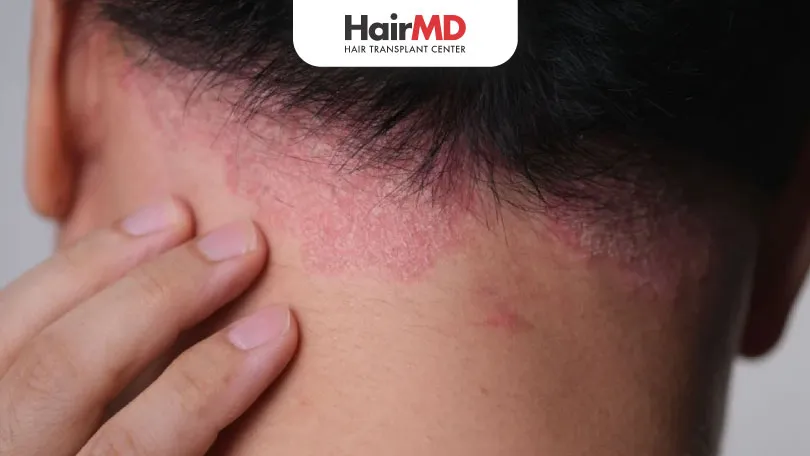21st Jan, 2024

In seborrheic dermatitis and hair loss, more hair falls out from the follicles regularly with no signs of regrowth, leading to the formation of bald patches. The condition of hair loss continues till the infection is not treated to restore the follicle health.
Continue reading to know how hair loss occurs due to irritation on the skin surface and when to visit a doctor.
What’s covered in the article?
- Does Seborrheic Dermatitis Cause Hair Loss?
- How to Treat Seborrheic Dermatitis and Hair Loss?
- When to See a Doctor?
- Conclusion
Does Seborrheic Dermatitis Cause Hair Loss?
Seborrheic dermatitis is an inflammatory skin condition where red flakes appear on the skin surface in the form of patches. This condition may indirectly lead to hair loss as it may appear anywhere on the scalp and be associated with infections like Malassezia and dandruff. It is associated with over secretion of sebum from the sebaceous glands. Sebum is an oily secretion that helps maintain scalp health by adding moisture. This seborrhoeic dermatitis leads to hair loss because of the scalp inflammation that it causes.
How to Treat Seborrheic Dermatitis and Hair Loss?
Seborrheic dermatitis can be treated with the help of some over-the-counter treatments that include the use of salicylic and selenium sulfide-containing products to reduce infection. Once the infection and inflammation are treated, the hair loss will be revered, and new hairs will regrow. Shampoos, antifungal creams and medicines prescribed by the doctor can help treat this scalp dermatitis.
When to See a Doctor?
Seborrheic dermatitis is easily identifiable. If you notice any such symptoms, then consult a hair doctor immediately.
- Red Scalp
- Greasy Skin
- Formation of Patches
- Dandruff that doesn’t go
- Infection on oily areas such as the nose and face
- Flakes over the Scalp
The increased loss of hair is another symptom. The infection can appear on any oily surface of the body, including the chest, eyebrows and ears. If not treated on time, it can spread to various portions and cause irritation and redness.
Do You Know?
Nearly 250 Patients Visit HairMD
Everyday For Various Hair Concerns?
(Your journey to healthier and fuller hair starts here!)
Meet Our Dermatologists
Conclusion
Further Reading
Top Kitchen Ingredients to Boost Hair Growth
Discover the best kitchen ingredients for hair growth! Use coconut oil, onion juice, aloe vera & more to nourish your hair naturally and reduce hair fall.
How to Treat Alopecia Areata at Home: Natural Solutions for Hair Growth
Explore home remedies for alopecia areata to promote hair regrowth and boost confidence from home.
Redensyl vs. Minoxidil: Which is the Better For Hair Growth?
Discover the differences between Redensyl and Minoxidil for hair growth. Learn about their effectiveness, side effects, and which treatment might be better for you.
Biotin-Rich Foods for Natural Hair Growth
Know the best foods rich in biotin to help your hair to grow naturally stronger and healthier by experts from HairMD, Pune
Have thoughts? Please let us know
We are committed not only to treating you, but also educating you.











